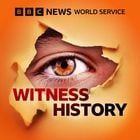During the 1940s, a playboy spy became one of wartime’s most successful double agents, as well as the reported inspiration behind James Bond.
A gambler and womanizer who spoke several languages, Dusko Popov was approached by a friend working for the Abwehr, Germany’s military intelligence.
But Dusko was vehemently anti-Nazi. He went straight to the British and volunteered his services, adopting the codename 'Agent Tricycle'. Intelligence officers then created realistic - but false - information for Dusko to pass back to his Nazi spymaster.
And it was during this time, that Dusko’s path crossed with a British naval intelligence officer called Ian Fleming, later the creator of James Bond.
Jane Wilkinson has been through the BBC archives to find out more.
Eye-witness accounts brought to life by archive. Witness History is for those fascinated by and curious about the past. We take you to the events that have shaped our world through the eyes of the people who were there.
For nine minutes every day, we take you back in time and all over the world, to examine wars, coups, scientific discoveries, cultural moments and much more.
Recent episodes explore everything from how the Excel spreadsheet was developed, the creation of cartoon rabbit Miffy and how the sound barrier was broken.
We look at the lives of some of the most famous leaders, artists, scientists and personalities in history, including: the moment Reagan and Gorbachev met in Geneva, Haitian singer Emerante de Pradines’ life and Omar Sharif’s legendary movie entrance in Lawrence of Arabia.
You can learn all about fascinating and surprising stories, like the invention of a stent which has saved lives around the world; the birth of the G7; and the meeting of Maldives’ ministers underwater. We cover everything from World War Two and Cold War stories to Black History Month and our journeys into space.
(Photo: Dusko Popov. Credit: AFP via Getty Images)


